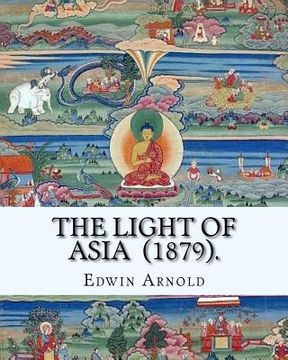The Light of Asia (1879). By: Edwin Arnold: Narrative poem (en Inglés)
Reseña del libro "The Light of Asia (1879). By: Edwin Arnold: Narrative poem (en Inglés)"
The Light of Asia, subtitled The Great Renunciation, is a book by Sir Edwin Arnold. The first edition of the book was published in London in July 1879. In the form of a narrative poem, the book endeavors to describe the life and time of Prince Gautama Siddhartha, who after attaining enlightenment became The Buddha, The Awakened One. The book presents his life, character, and philosophy, in a series of verses. It is a free adaptation of the Lalitavistara. A few decades before the book's publication, very little was known outside Asia about the Buddha and Buddhism, the religion which he founded, and which had existed for about twenty-five centuries. Arnold's book was one of the first successful attempts to popularize Buddhism for a Western readership.The book has been highly acclaimed from the time it was first published, and has been the subject of several reviews. It has been translated into several languages, including Hindi.................................. Sir Edwin Arnold KCIE CSI (10 June 1832 - 24 March 1904) was an English poet and journalist, who is most known for his work The Light of Asia. Biography: Arnold was born at Gravesend, Kent, the second son of a Sussex magistrate, Robert Coles Arnold. One of his six children was the novelist Edwin Lester Arnold. He was educated at King's School, Rochester; King's College London; and University College, Oxford, where he won the Newdigate prize for poetry in 1852. He became a schoolmaster, at King Edward's School, Birmingham, and in 1856 went to India as Principal of the Government Sanskrit College at Poona, a post which he held for seven years, which includes a period during the mutiny of 1857, when he was able to render services for which he was publicly thanked by Lord Elphinstone in the Bombay Council. Here he received the bias towards, and gathered material for, his future works. Returning to England in 1861 he worked as a journalist on the staff of the Daily Telegraph, a newspaper with which he continued to be associated as editor for more than forty years, and of which he later became editor-in-chief. It was he who, on behalf of the proprietors of the Daily Telegraph in conjunction with the New York Herald, arranged the journey of H.M. Stanley to Africa to discover the course of the Congo River, and Stanley named after him a mountain to the north-east of Albert Edward Nyanza. Arnold must also be credited with the first idea of a great trunk line traversing the entire African continent, for in 1874 he first employed the phrase "Cape to Cairo railway" subsequently popularised by Cecil Rhodes. It was, however, as a poet that he was best known to his contemporaries. The literary task which he set before him was the interpretation in English verse of the life and philosophy of the East. His chief work with this object is The Light of Asia, or The Great Renunciation, a poem of eight books in blank verse which was translated into various languages such as Hindi (tr. by Acharya Ram Chandra Shukla). In it, in Arnold's own words, he attempted 'by the medium of an imaginary Buddhist votary to depict the life and character and indicate the philosophy of that noble hero and reformer, Prince Gautama of India, founder of Buddhism'. It appeared in 1879 and was an immediate success, going through numerous editions in England and America, though its permanent place in literature is quite uncertain. It is an Indian epic, dealing with the life and teaching of the Buddha. The poem was subjected to two lines of criticism: it was held by Oriental scholars to give a false impression of Buddhist doctrine; while, on the other, the suggested analogy between Sakyamuni and Jesus offended the taste of some devout Christians....

